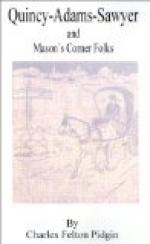“That makes five thousand a year,” said Aunt Ella quickly. “Well, I’ll allow you five thousand more a year, and the day you are married I’ll give you as much outright as your father did. That’s unconditional. Now, conditionally, if you bring your wife here and live with me you shall have rooms and board free, and I’ll leave you every dollar I possess when I’m through with it. Don’t argue with me now,” she continued, as Quincy essayed to speak. “Think it over, tell her about it. You will do as you please, of course, but I shall not change my mind on this point.”
“Didn’t your husband leave any relatives that might turn up and prevent any such disposition of your property?”
“When we married, Robert said he was alone in the world,” replied Aunt Ella; “he had no sisters, and only one brother, named Charles. Charles was an artist; he went to Paris to study about thirty-five years ago. From there he went to London. Some thirty years ago Robert got a letter from him in which he said he was going to return to America. Robert waited, but he did not come; then he wrote again to his English address, but the letter was returned with the words ‘Gone to America’ endorsed thereon.”
“Was he married?” inquired Quincy.
“Robert never knew,” said Aunt Ella, “but he imagined not, as Charlie, as he called him, never spoke in his letters of being in love, much less of being married.”
Quincy caught the three o’clock train to Eastborough Centre, and Ellis Smith, another son of ’Bias Smith, who had taken the hotel carriage in place of his brother Abbott, drove him home.
A few days thereafter invitations to the wedding of Ezekiel Pettengill and Hulda Ann Mason were sent broadcast through Eastborough Centre, West Eastborough, Mason’s Corner, and Montrose. Then it was decided by the gossips that Ezekiel was going to have Mr. Sawyer and Hiram Maxwell and Sam Hill to stand up with him, while Huldy Ann was going to have Alice Pettengill, Mandy Skinner, and Tilly James as bridesmaids.
The whole town turned out when the two gaudy wagons, with their handsome horses and fine harness reached Eastborough Centre, and a number of Centre folks followed the unique procession over to Mason’s Corner. One of the wagons contained the new sign, which was soon put in place, and was a source of undisguised admiration for a long time.
On the tenth of April, Strout & Maxwell’s two heavy teams went over to Eastborough Centre and returned about noon heavily loaded, followed by three other teams from the Centre equally well filled. Then Mr. Obadiah Strout could contain himself no longer. He let the cat out of the bag, and the news spread like wildfire over the village, and was soon carried to Eastborough Centre and to Montrose. The Mason’s Corner church was to have a new organ, a present from Mr. Sawyer, and Professor Obadiah Strout had been engaged to officiate for one year.
The nineteenth of April was fixed for Huldy’s wedding day. The hour was ten in the morning. As early as eight o’clock teams began to arrive from north, east, south, and west. Enough invitations had been issued to fill the church, and by half-past nine every seat was taken.




